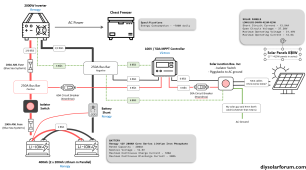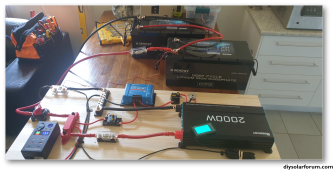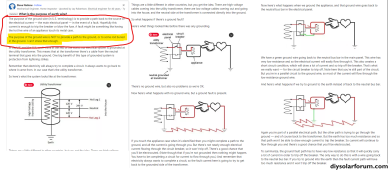Hi All,
Very first post here...
I just built my first 12V off grid system (I'm not an expert by any means) and have some questions re: grounding / earthing.
Please see attached images for conceptual system diagram of my system, and also a pic of the actual system.
Note: I had the solar guy install my 830W panels (Longi 415w x 2) today (Tue 17-Oct-2023), but I haven't yet connected the solar to my 12V system (as I want to make sure I have the grounding right).
From what I've read, and research done, "the purpose of ground wire is to provide a path back to the source of the electrical current - the main electrical board - in the event of a fault" and "NOT to provide a path to the ground, or to some road buried in the ground".....See image below for where I sourced this information
As such, I intend to ground my system as outlined in my conceptual diagram (see dotted green lines).
My main question therefore is ----------> does this ground wiring look right, is it correct / safe / best-practice?
Kind Regards
GeeGee
PS, yes, I've read that technically you don't need to ground a 12V system, but I don't mind if I do, and I guess I just want to be super safe and also understand how to do it.
PPS, I've read that the grounding wire needs to be one step down from your maximum rated wire (in my case 2/0 AWG), but I've also read that you can get away with 6 AWG. However, if I was to go one-step down, then I very much doubt I could work with 1/0 AWG wire...it would be just too thick to work with (e.g. connecting to the Junction Box, connecting Inverter & MPPT to negative bus bar).
PPPS, as for the concept of grounding, I have a fundamental / silly question ----> in the case of a short circuit, why does the law of physics choose to send the excessive current to the ground path? I mean, what is the rational / theory / physics behind sending excessive current to the ground as opposed to just letting it circulate within the circuit itself (where I'm assuming it would eventually just blow a fuse/circuit breaker)?
12V off-grid system - Conceptual Diagram

12V off-grid system - actual setup

What is the purpose of Ground Wire?
Source: https://www.quora.com/What-is-the-purpose-of-a-ground-wire

Very first post here...
I just built my first 12V off grid system (I'm not an expert by any means) and have some questions re: grounding / earthing.
Please see attached images for conceptual system diagram of my system, and also a pic of the actual system.
Note: I had the solar guy install my 830W panels (Longi 415w x 2) today (Tue 17-Oct-2023), but I haven't yet connected the solar to my 12V system (as I want to make sure I have the grounding right).
From what I've read, and research done, "the purpose of ground wire is to provide a path back to the source of the electrical current - the main electrical board - in the event of a fault" and "NOT to provide a path to the ground, or to some road buried in the ground".....See image below for where I sourced this information
As such, I intend to ground my system as outlined in my conceptual diagram (see dotted green lines).
My main question therefore is ----------> does this ground wiring look right, is it correct / safe / best-practice?
Kind Regards
GeeGee
PS, yes, I've read that technically you don't need to ground a 12V system, but I don't mind if I do, and I guess I just want to be super safe and also understand how to do it.
PPS, I've read that the grounding wire needs to be one step down from your maximum rated wire (in my case 2/0 AWG), but I've also read that you can get away with 6 AWG. However, if I was to go one-step down, then I very much doubt I could work with 1/0 AWG wire...it would be just too thick to work with (e.g. connecting to the Junction Box, connecting Inverter & MPPT to negative bus bar).
PPPS, as for the concept of grounding, I have a fundamental / silly question ----> in the case of a short circuit, why does the law of physics choose to send the excessive current to the ground path? I mean, what is the rational / theory / physics behind sending excessive current to the ground as opposed to just letting it circulate within the circuit itself (where I'm assuming it would eventually just blow a fuse/circuit breaker)?
12V off-grid system - Conceptual Diagram

12V off-grid system - actual setup

What is the purpose of Ground Wire?
Source: https://www.quora.com/What-is-the-purpose-of-a-ground-wire



